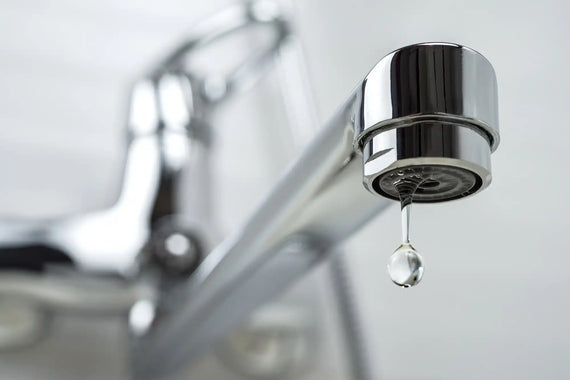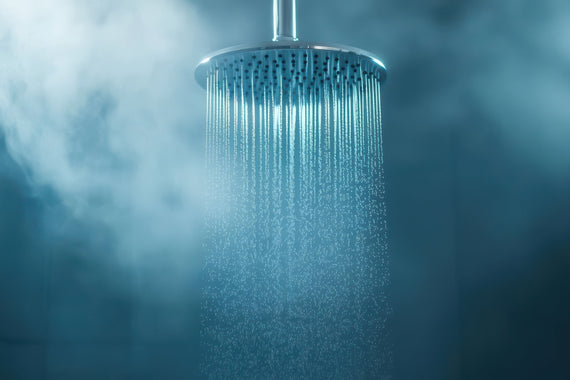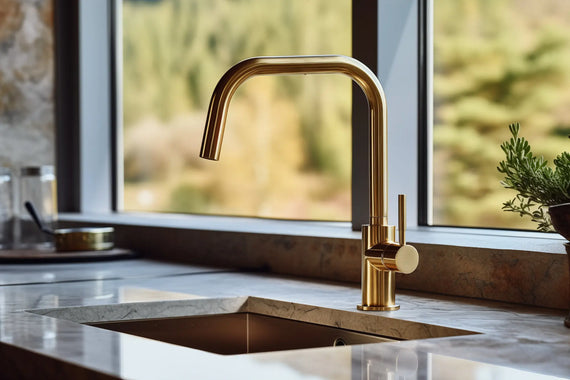The Complete Guide to Shower Head Filters: Benefits, Types, and Effectiveness

Many people in the UK have concerns about the quality of the water they shower in. Imagine a simple fix that could improve the quality of your shower water, leaving it free of chlorine, heavy metals, and other impurities. For many, the idea of showering in cleaner, filtered water is not just about luxury - it’s about improving skin and hair health while avoiding potential irritants. But how effective are shower filters, and what benefits can they really offer?
As water quality concerns grow, shower filters have surged in popularity, promising to remove contaminants and provide a better showering experience. These devices often claim to improve skin health, reduce hair damage, and even address hard water. However, not all filters are created equal, and understanding their capabilities requires a deeper look.
With years of experience in water testing and contaminant analysis, we’re uniquely positioned to evaluate the claims surrounding shower filters. In this article, we’ll explore the different types of shower filters, their benefits, and their limitations. Whether you’re concerned about chlorine exposure or curious about their ability to tackle hard water, this guide will provide the clarity you need to make an informed decision.
What are shower head filters
Shower filters are devices installed directly onto your showerhead or between the water pipe and the showerhead. Their primary purpose is to filter impurities from the water before it comes into contact with your skin and hair. These impurities can include chlorine, chloramines, volatile organic compounds (VOCs), and, in some cases, heavy metals and sediments.
People choose shower filters for various reasons. Chlorine, commonly used in the UK for water treatment to kill bacteria, can cause dryness and irritation to both skin and hair. Hard water minerals like calcium and magnesium can leave behind residues, leading to dull hair and clogged pores. Additionally, some filters claim to neutralize odours and improve the overall feel of water.
Manufacturers often market these filters as a solution for healthier skin and shinier hair, with some products even suggesting benefits for sensitive skin conditions. While these claims can be compelling, it’s important to understand the types of filter media used and their effectiveness at addressing specific contaminants.
Materials Used in Shower Head Filters
A quick search for 'shower filter' on Amazon reveals hundreds of eye-catching options, many featuring colorful filter media making some bold marketing claims. But should you be swayed by promises of 5-stage, 15-stage, or even 34-stage filtration? We take a critical look at some of the common materials used:
- 1. Carbon Block
- Claims: Effective at removing chlorine, organic compounds, and improving water smell and taste.
- How It Works: Carbon block uses adsorption, a process where contaminants bind to the carbon’s surface. Its porous structure maximizes surface area for trapping impurities.
- What It Is: Made from compressed activated carbon derived from coconut shells, coal, or wood.
- Our View: Carbon is highly effective for chlorine and some VOCs but struggles with minerals like calcium and magnesium.
- 2. KDF (Kinetic Degradation Fluxion)
- Claims: Reduces chlorine, heavy metals (e.g., lead, mercury), and inhibits bacterial growth.
- How It Works: KDF uses a redox reaction to convert contaminants into harmless compounds. For instance, chlorine is transformed into chloride ions.
- What It Is: A granular alloy of copper and zinc.
- Our View: Works well for chlorine and metals but has limited impact on hardness minerals. Effective at high water temperatures.
- 3. Vitamin C
- Claims: Neutralizes chlorine and chloramines, promoting healthier skin and hair.
- How It Works: Vitamin C reacts with chlorine and chloramines, breaking them down into less harmful substances.
- What It Is: Derived from ascorbic acid, a naturally occurring compound found in citrus fruits.
- Our View: Excellent for chlorine removal but ineffective for hard water minerals or heavy metals.
- 4. Zeolite
- Claims: Removes heavy metals, ammonia, and some organic compounds.
- How It Works: Zeolite is a microporous mineral that traps contaminants through ion exchange and physical adsorption.
- What It Is: A naturally occurring or synthetically produced aluminosilicate mineral.
- Our View: Effective for specific heavy metals and ammonia but has limited application for chlorine or hardness.
- 5. Tourmaline
- Claims: Softens water, improves pH balance, and produces negative ions for healthier skin.
- How It Works: Tourmaline generates weak electrical charges that claim to alter water’s molecular structure.
- What It Is: A crystalline boron silicate mineral found in granite and other rocks.
- Our View: Limited scientific evidence supports water softening or ionization effects; most benefits are anecdotal.
- 6. Maifan Stone
- Claims: Adds beneficial minerals, balances pH, and removes some impurities.
- How It Works: Maifan stone slowly releases trace minerals while adsorbing certain contaminants.
- What It Is: A mineral-rich stone commonly found in Chinese mountain regions.
- Our View: Maybe it can slightly improve water mineral content but is not a primary filtration method for chlorine or metals. We think it’s unlikely to make any noticeable difference.
- 7. Calcium Sulphite
- Claims: Removes chlorine and improves water quality at high temperatures.
- How It Works: Calcium sulphite reacts with chlorine, converting it to harmless salts.
- What It Is: A chemical compound produced synthetically for industrial and filtration purposes.
- Our View: Very effective for chlorine removal but does not address hardness or heavy metals.
- 8. FIR Ceramic Balls
- Claims: Improves water quality by releasing far-infrared radiation, softens water, and enhances mineralization.
- How It Works: Manufacturers claim that FIR ceramic balls emit low-level infrared energy that is claimed to reduce water cluster size and improve absorption.
- What It Is: Small ceramic spheres made from a blend of mineral-rich clays and other natural compounds.
- Our View: The scientific evidence for FIR effects on water structure is limited. While they may add trace minerals, their effectiveness as a standalone filter material is doubtful.
The various materials used in shower filters are generally effective at removing chlorine, thanks to its highly reactive nature, which makes it relatively easy to target and neutralize. However, when it comes to addressing water hardness, there is little evidence to suggest that any of these materials we’ve seen used can significantly reduce the mineral content responsible for scale buildup. As such, while these filters may improve water quality in specific ways, they are not a reliable solution for combating hard water.
Benefits of using shower head filters
Shower filters are becoming an increasingly popular addition to bathrooms, with their primary benefit being the ability to reduce chlorine levels in your water. Chlorine is commonly added to municipal water supplies to kill bacteria and other pathogens, ensuring water is safe to drink. However, for some people, especially those with sensitive skin, eczema, or respiratory issues, exposure to chlorine in shower water can cause irritation. Chlorine's reactive nature means it can strip natural oils from the skin and hair, leading to dryness, itchiness, and brittleness in hair over time.
Using a shower filter can help alleviate these concerns by removing or significantly reducing chlorine before it comes into contact with your skin. This can make showers more comfortable for individuals who are sensitive to chlorine, leaving their skin feeling less dry and their hair more manageable. Additionally, some filters may also reduce other impurities, such as sediment or certain chemical by-products, further improving water quality.
While a shower filter won't address all water quality issues, such as hardness, it provides an accessible and practical solution for those looking to minimize their exposure to chlorine and enjoy a more comfortable showering experience.
Limitations of shower head filters
While shower filters offer certain benefits, they come with notable limitations that are important to consider before purchasing. One significant drawback is their inability to effectively address water hardness. Hard water, caused by dissolved minerals such as calcium and magnesium, leads to scale buildup, soap scum, and dry skin. Unfortunately, shower filters are not designed to remove these minerals. For those dealing with hard water, an ion exchange water softener is the only reliable solution.
The market for shower filters is flooded with dubious claims from manufacturers. Many compete to include increasingly complex and colourful stages of filtration, such as 10, 15, or even 34-stage systems, often without rigorous scientific validation. These marketing tactics can mislead consumers into believing these filters provide comprehensive water treatment, when in reality, their capabilities are limited.
Choosing the Right Shower Head Filter
When selecting a shower filter, it’s essential to consider your specific needs and the water quality in your area. For instance, if chlorine removal is your priority, look for filters that feature proven materials like carbon block, KDF, or calcium sulphite. These materials are highly effective at targeting chlorine and can significantly improve your shower experience.
Pay attention to flow rate and water pressure compatibility. Some filters may reduce water pressure, especially in areas where tap water pressure is already low. Additionally, consider the lifespan of the filter cartridge, as frequent replacements can add to the cost over time.
Avoid falling for marketing hype around multi-stage filters with colourful media, as these often lack scientific validation. Instead, opt for filters from reputable manufacturers with clear performance data and customer reviews. If hard water is a concern, remember that shower filters cannot replace a whole-house ion exchange water softener, which is the only effective solution for water softening.
Our Recommendation
For those looking to reduce chlorine in their shower water, a well-made shower filter can be an effective solution, especially for individuals with sensitive skin or hair concerns. In the UK, tap water is chlorinated to an average of 0.5 mg/L, which is relatively low compared to some countries, such as the USA, where chlorine levels in municipal water are often higher. A quality shower filter can help mitigate the effects of chlorine exposure, potentially improving skin and hair health by reducing dryness and irritation.
We recommend selecting a shower filter from a reputable manufacturer with transparent claims and established credibility. Avoid cheap, multi-stage filters with exaggerated marketing claims often found on online marketplaces like Amazon. Many of these products promise unrealistic filtration capabilities, such as water softening, despite the physical limitations of their small size.
It's important to note that while some filters claim to address water hardness, the amount of filter media they contain is insufficient to significantly reduce mineral content. If hard water is your primary concern, the only reliable solution is a whole-house ion exchange water softener.
A high-quality shower filter is an excellent choice for chlorine removal and enhanced shower comfort, but it should not be relied upon for comprehensive water treatment, especially in addressing hard water.




















